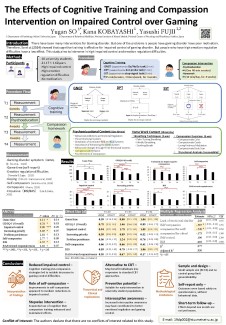The Effects of Cognitive Training and Compassion Intervention on Impaired Control over Gaming

Background and Objectives: Cognitive behavioral therapy (CBT) is the first-line treatment for gaming disorder (GD), as it addresses background factors. However, certain limitations exist. Cognitive training has been explored as an intervention targeting specific factors of GD, yet its effectiveness may be reduced in individuals with high emotion regulation difficulties. To address this limitation, the present study examined the effects of an intervention incorporating compassion-based strategies to mitigate emotion regulation difficulties in individuals with GD.
Methods: Participants were 10 university students (mean age = 21.30 ± 1.73 years) with high levels of GD symptoms and emotion regulation difficulties exceeding +1 SD from the mean. Assessments of GD-related variables were conducted at four time points (T1–T4) at one-month intervals. The intervention protocol included cognitive training from T1 to T2, a compassion-based intervention from T2 to T3, and a follow-up period without intervention from T3 to T4. The cognitive training aimed to enhance response inhibition and attention bias modification toward game-related stimuli. It consisted of 15-minute sessions, conducted three times per week, utilizing Go/No-Go, stop-signal, and dot-probe tasks.
The compassion-based intervention involved daily breathing exercises and compassion-focused exercises for at least 10 minutes. The intervention was associated with a reduction in impaired control over gaming (effect size: d = 0.94, 95% CI [0.07, 1.80] from T1 to T2; d = 1.78, 95% CI [0.75, 2.81] from T1 to T3), along with improvements in GD-related variables and self-compassion. Multiple regression analysis further suggested that self-compassion may play a role in reducing impaired control.
Conclusions: Cognitive training may be particularly beneficial for individuals with early-stage GD or mild symptoms. Moreover, the findings suggest that interoceptive awareness, which is linked to both compassion and emotion regulation difficulties, may be a crucial factor in addressing impaired control in GD.